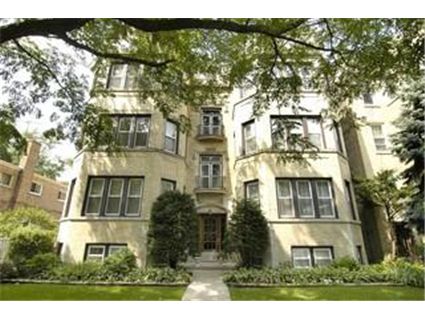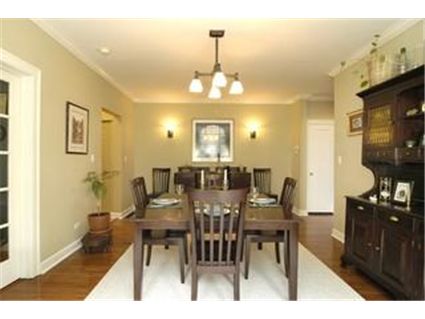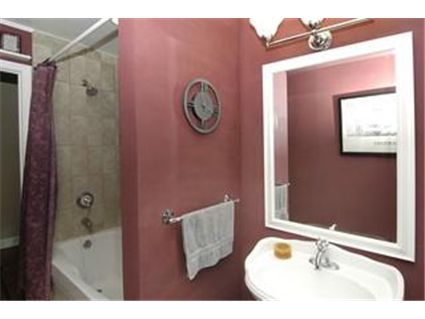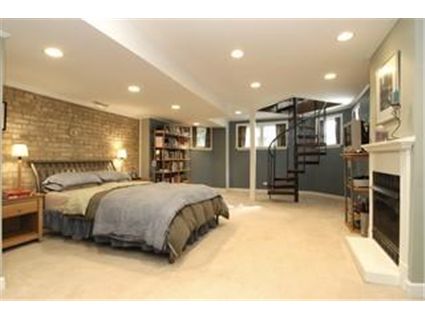Five Months Later and Still On the Market: 7406 N. Claremont
I chattered about this pretty vintage unit at 7406 N. Claremont in West Ridge in mid-January 2008.

It is still on the market and has been reduced- but not by much.





7406 N. Claremont #1S: 3 bedrooms, 3 baths, duplex, 3100 square feet
- Sold in March 2002 for $302,000
- Was listed in January 2008 for $434,900 (includes the parking)
- Reduced
- Currently listed for $414,900
- Seller will now pay assessments for six months
- Assessments of $232 a month
- Keller Williams Lincoln Park has the listing
It is kinda cute, but I would not live in a duplex down place due to … FLOOD 😉
That is a real nice place.
“due to … FLOOD”
Worried about sewer back-up or thru-the-window flooding? sewer back-up can be dealt with with overhead lines, but obviously I can’t tell if they did that here by the pics. Based on price, probably not.
This actually brings up a good point: does anyone here own a garden unit? And if so, did you try to get flood insurance? The federally subsidized flood insurance program WILL NOT insure any below grade living space–including not only finished basements like this seems to be, but also whole garden units, which are a few feet underground. But infuriatingly, one can’t buy private flood insurance either–all flood insurance in this country must be purchased from the fed.
Post-Katrina, I decided to buy flood insurance, and found that I couldn’t. Does anyone have advice?
There is no way a condo like this in West Ridge is going to sell for anything like $414K. In fact, it’s a wonder they could ever get the 2002 price, and that’s the most they can expect to get now.
It’s a great place, but it is still a condo, and is a duplex down.
Also, West Ridge is a beautiful neighborhood with incredible architecture, but it is beginning to visibly deteriorate.
Thats a lot of square footage. The taxes can’t be cheap.
Kenworthey, you are right about flood insurance in that it is only available in designated flood zones. However, most private insurers offer the option of sewer back-up insurance for situations like this. The last time I got a quote it would have added approx 25-30% to the policy cost, but that was for mostly unfinished space. It is probably more for fully finished space.
I like duplex downs for the extra space and media possibilities (think home theater, without having to worry about noise) — but a lot of people seem to be against them. Being new to Chicago, I don’t know the real likelihood of flood damage possibility? Does it happen a lot here in the summer? I would have to imagine that some duplex downs are well built and can withstand flood possibility. Is it really a value-destroying feature?
For my part, it would suck to have thousands of dollars of audio-video equipment being destroyed by a flood.
Yeah, I actually have sewage back-up insurance as part of my condo-owner’s plan; it’s Armageddon insurance that isn’t available! I live two blocks from the lake, and you know how prone Lake Michigan is to tsunamis… seriously, though, it does seem at least possible that heavy heavy rains could screw me over (I’m in a “mild to moderate flood zone” or soemthing like that, as is pretty much everywhere around here), and it is frustrating not to be able to insure against that possibility.
I’m def. not one of those anti-government libertarian types… but in this one area, I confess to finding the government-imposed monopoly infuriating. And given how many homes in this country are garden apartments (1-2% guessing), I’m kind of surprised no one talks about this deficiency with the federal flood insurance program.
Why are insurance companies perfectly willing to write fire coverage policies (when fire damages often cause a total loss to property and contents) but are completely unwilling to write flood coverage which often results in partial damages? That has never made sense to me.
In Chicago, chances are you’d only flood from a sewer/drainage backup anyway. If Chicago actually had an all-out flood wherein the lake level rose several feet and inundated the whole city New Orleans-Katrina-style, whether or not your A/V equipment is insured will be the least of your worries.
It’s not “won’t,” it’s “aren’t allowed.” For some reason that *I* don’t understand, the federal government (used to be under FEMA, don’t know if it’s still so) implemented a subsidized flood insurance program, and tells insurers they are not allowed to offer it except through this program.
Left to their own devices, the insurers would be happy to provide market-priced flood insurance to any and all comers. True, not many would buy it, but not many people buy it even in high-flood-prone areas now, despite the fact that it is subsidized by the rest of us. (Remember how many homes in Mississippi and Louisiana were not covered? Even the homes of people who should know better and could certainly afford it?) This is one of those things that really should be left to the free market, or at least more so than it is now.
The government regulates where it shouldn’t (flood insurance) and fails to regulate where it should (mortgages)!
David, I guess you are right, but that is just an argument that my flood insurance should be very cheap, since the contingency it covers is very remote… I do think I’m too paranoid about this whole global warming thing! But seriously, are you and G saying that if it rained really, really hard, and my foundation/bricks failed and water seeped in, that the sewage/drainage rider would cover it? (Sorry to ask questions like this in this forum!)
I would guess it has to do with the scale of the losses. Fires for most of the country are usually isolated to one property and maybe a few adjacent props. Floods tend to do damage on a whole different scale, and mostly in a very unpredictable manner.
I think that if there is too much risk for private flood insurers, then the govt should not fill the void. All the govt is doing is encouraging construction in flood zones, something that private insurers have deemed unprofitable. Its just one more subsidy we all pay that benefits the RE industry.
G–yes, absolutely–the subsidized insurance leads to far, far more building than there should be in inappropriate places (e.g. coastlines). It is an especially perverse subsidy, because it involves subsidies from “the rest of us” to people who are rich enough to be building fancy coastal homes.
Kenworthey, seepage through your wall (not from ground up) would be the result of poor maintenance (not covered) or would just be storm damage (probably covered.)
Also, those who don’t have flood insurance in an insurable area means they don’t have a mortgage either because it is required by lenders.
G –
Huh? I have a mortgage and no flood insurance on my house.
Then you must not live in an insurable area (designated flood zone.)
Chicago installed restrictor covers on the street grates, which restricts and slows the amount of flowing stormwater (which is flowing rainwater) which can enter that sewer grate. This slows down the accumulated flow of stormwater in the street sewers, which contain both sanitary sewage from building sewer lines as well as stormwater flow run-off from the street grates. But these restrictor covers also caused stormwater run-off flow to back-up on the streets, overflowing over the curbs, often flooding the sidewalks, and flowing into adjacent building basements. Many Chicago building owners have experienced basement flooding since these restrictors have been installed.
So long as Chicago relies on restrictors to slow down stormwater flow into its sewer system, basement or “garden” apartments will be at significant risk for flood damage.
We’ve lived in three different houses in three different Chicago area in 15 years. In each house we’ve had at least two serious basement flood situations. We keep anything that can be water-damaged at least 12″ above the floor, w/exception that our HVAC, water heater, and stack washer are still at risk.
“Left to their own devices, the insurers would be happy to provide market-priced flood insurance to any and all comers. True, not many would buy it, but not many people buy it even in high-flood-prone areas now, despite the fact that it is subsidized by the rest of us. This is one of those things that really should be left to the free market, or at least more so than it is now.”
Kenworthy, have you priced earthquake insurance? The first 10% of the damage is your deductible and the annual cost is 7-8% of the amount covered. That’s in Chicago, city of earthquakes. Now how much would it cost in San Francisco? No company wants “too much” risk from one event.
I’m typing this from a duplex basement which has been dry since we bought in 2002.
Not only have I priced it, I have it. I pay $52 a year for $82,000 of earthquake coverage on my unit; you are right that the first 10% of the damage is my deductible. But $52 is certainly not 7-8% of the amount covered annually by a long shot. Maybe you should shop around…
Kenworthy,
I was pricing insurance on the condo structure. American Family and State Farm were in the same ballpark. However, I suspect your insurance was for contents and that’s a good price.
Jay
i like the bedroom…. it’s huge….lol
I am the owner of the property and only just seeing this now. A few points:
– there has NEVER been a flood in this building as a result of sewer backup. The rain-blockers on the street are very effective. Additionally, the building has a sewer drain ejector pump which works quite well…although it has never been needed.
– the building is NOT in a flood plain as verified by FEMA maps.
– West Ridge is NOT, repeat NOT deteriorating as Laura has suggested. Additionally, she is also seriously incorrect about pricing here. There has been new construct which has sold considerably higher AND, vintage restored as well. But that was 2008, now it’s 2010.
– The property is coming back to market in a few weeks at $349,900, which is suitably priced for this market and with the multiple upgrades. 3200 square feet.
My 2 cents. 🙂